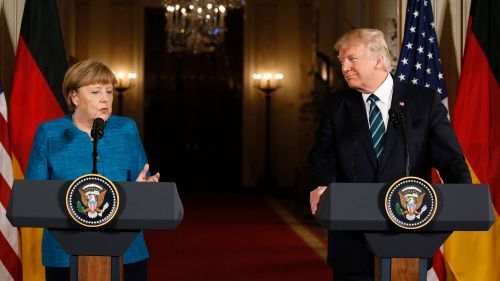Why "America First" Doesn’t Resonate in Germany

German policy and thought leaders generally look for political and economic integration to ensure stability. This presents a sharp contrast to the drum-beating "America First" position.
Germany’s connection to multilateralism
Germany holds a distinctly different vision of international relations than the current US administration. As a country formed out of cooperative institution building following the Second World War, it places great emphasis on preserving the multilateral world order that the United States and its allies built in the late 20th century.
With obvious historical foundations for this lean toward multilateralism, German policy and thought leaders generally look for political and economic integration to ensure stability.
This presents a sharp contrast to the drum-beating "America First" position the Trump administration has championed. Why does this viewpoint fall on such deaf ears in Germany? Three major policy arenas show why Germany’s connection to multilateralism is deeper than in the United States.
Trade Policy
A primary example of the importance of multilateral structures is the development of German trade policy (through its membership in the European Union) and involvement in cooperative institutions such as the WTO, an organization the Trump administration has actively undermined.
The preservation of the WTO and the rules-based international order goes to the heart of the matter for Germany. For over 70 years, multilateral decision-making on trade policy was a tenet of the GATT and later the WTO, organizations of which both Germany and the United States were original members.
As US interest wanes, Germany and the EU continue to advocate for multilateral decision-making, calling for reform of the WTO and further development the rules-based trading system. In the past two years, the EU has completed free trade agreements with both Japan and Canada, two of the largest global economies that, along with the EU, are pushing for further global trade integration.
European Integration
Germany is also a stalwart defender of European integration. The EU project has paid dividends for Europe and Germany, leading to stability and cooperation across the continent, and not least preventing armed conflict.
As the largest EU country, Germany influences policy through European-wide mechanisms such as the European Central Bank and the European Commission. While this has led to conflict with some EU partners, Germany’s work with allies and neighbors such as France has helped to build economic and political stability for a continent that possessed little in the early 20th century.
This philosophy of European integration and institution building was shared by former US presidents and policymakers of both political parties, but has been repeatedly called into question by the current US administration.
Security Policy
The preference for a multilateral approach also governs Germany’s security policy, where it is much more comfortable projecting force in a cooperative framework and within a European policy of common defense.
The cornerstone of this common defense policy is NATO, and threats to weaken the 29-country bloc have spurred a reassessment of Germany’s military capabilities. These are not empty concerns, as recent German defense spending has been lackluster. However, growing disquiet emanating from NATO’s eastern flank have led to German troop deployments in the Baltics and planned defense spending increases.
Germany also supports the European defense fund to ensure the compatibility of military hardware across the continent and dissuade the inefficient development of independent weapon systems. There has even been discussion of a multi-country European Army, although this is quite far off.
While Euro-skeptic parties, such as the Alternatief für Deutschland, are beginning to gain representation, working collectively through multilateral institutions remains embedded in the societal and political DNA of Germany.
But in the end, multilateral institutions risk being undermined without the participation of the largest economic and global security players. Although the United States has not yet left institutions such as the WTO and NATO, chipping away at decades of goodwill jeopardizes our common transatlantic future.
Foreign policy differences may exist between allies, but incompatible theories of international relations cannot grate at the foundation of an alliance in perpetuity. Looming events, whether concerning the dispute settlement mechanism at the WTO or the ongoing trade tensions involving steel, aluminum, and autos, offer the opportunity for rapprochement, but also risk placing the relationship on much less stable ground.

